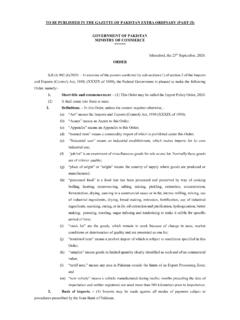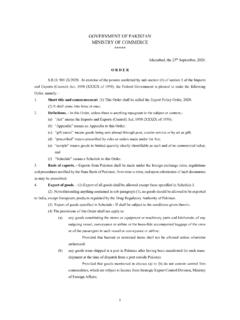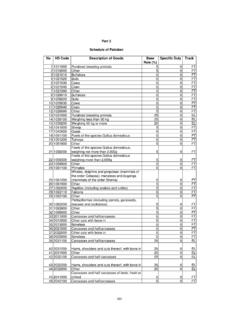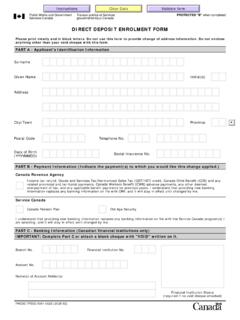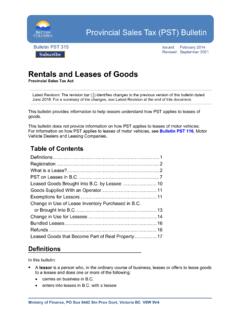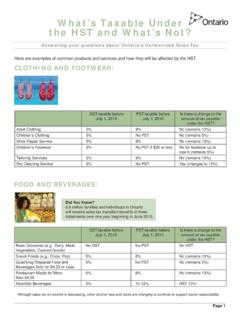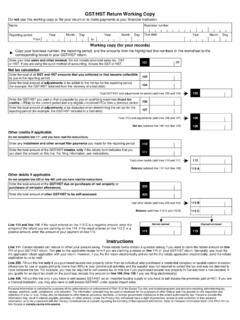Transcription of E-COMMERCE POLICY FRAMEWORK OF PAKISTAN
1 E-COMMERCE POLICY FRAMEWORK OF PAKISTAN . September 2019. Government of PAKISTAN Ministry of commerce & Textile ( commerce Division). FOREWORD. The emergence of E-COMMERCE platform has paved the way for inclusive trade and economic development. Global E-COMMERCE has been growing exponentially since the last two decades and recorded sales growth of 13% in 2017 with estimated sales of $29 trillion. In addition, the number of online shoppers grew by 12% and reached billion. E-COMMERCE can help developing country entrepreneurs to overcome the usual trade channels and reach a global market since internet based enterprises can be operated at very small scale. Studies show that Micro Small and Medium Enterprises (MSMEs), that use E-COMMERCE platforms, are around five times more likely to export than those in the traditional economy. Moreover, it has been estimated that the costs associated with geographic distance drop, by as much as two-thirds, for exporters who use digital trading platforms.
2 This implies potentially substantial gains for small and medium-sized enterprises, as well as female-headed enterprises, which are now able to go global' much more easily than was possible in the past. E-COMMERCE in PAKISTAN is at a nascent stage with modest internet retail sales. However, it is an emerging sector with a noticeable surge in recent past in online vendors, local E-COMMERCE platforms and online payment facilities introduced by banks and facilitated/enabled by cellular companies through their nationwide networks. E-COMMERCE businesses such as , and others are already achieving significant business in PAKISTAN indicating a positive trend for a growing E-COMMERCE sector of PAKISTAN . PAKISTAN is also a leader in mobile banking transactions in South Asia. The formulation of the E-COMMERCE POLICY is a step in fulfilling the Government's vision and commitment to effectively promote and encourage businesses, especially MSMEs to go online and foster holistic growth of E-COMMERCE in PAKISTAN .
3 The POLICY covers and provides guidelines on key components for promotion of E-COMMERCE including regulatory environment, financial inclusion and digitization through payment infrastructure, empowering youth and SMEs, consumer protection, taxation, ICT infrastructure, logistics and engagement in multilateral negotiations. E-COMMERCE POLICY is part of the overall Digital PAKISTAN ' POLICY launched under the vision of the Prime Minister of PAKISTAN . Around 64% of PAKISTAN 's population is under the age of 29 and is, thus, more open to embrace technology. The Government, cognizant of PAKISTAN 's youth potential, has already launched Kamyab Jawan and Ehsas programs which will be complemented by this POLICY . PAKISTAN and its youth have an exciting journey ahead and the promotion and regulation of E-COMMERCE becomes more significant in providing employment to around 130 million PAKISTAN 's youth in the next 30. years. Let us work together to reap the benefits of E-COMMERCE and create a better future.
4 Abdul Razak Dawood Adviser on commerce , Textile, Industry & Production and Investment TABLE OF CONTENTS. Abbreviations and Acronyms Definitions Executive Summary 1. Vision Statement 5. POLICY Goals 5. Current status of E-COMMERCE 7. Need for an E-COMMERCE POLICY 10. i. E-COMMERCE Regulation and Facilitation 12. ii. Financial Inclusion and Digitization through payment infrastructure 15. iii. Empowering Youth And SMES through Business Support Programs 17. and Trade Development iv. Consumer Protection 19. v. Taxation Structure 22. vi. ICT Infrastructure and Telecom services in PAKISTAN 23. vii. Logistics 24. viii. Data Protection and Investment 25. ix. Global Connectivity and participation in Multilateral Negotiations 27. Implementation of E-COMMERCE POLICY FRAMEWORK (Annexure-I) 28. Governance of E-COMMERCE Council (Annexure-II) 30. Initiatives through Public Private partnership to promote training, 31. capacity building, freelancing and digital marketing (Annexure-III).
5 Code of Conduct for E-COMMERCE Platforms (Annexure-IV) 33. Action Matrix (Annexure-V) 35. ABBREVIATIONS AND ACRONYMS. $ United States Dollar ADB Asian Development Bank ATM Automated Teller Machine AWB Air-Way Bills B2B Business-to-Business B2C Business-to-Consumer B2G Business-to-Government C2C Consumer to Consumer CNP Card-Not-Present CP Card-Present ETO Electronic Transactions Ordinance, 2002. FBR Federal Board of Revenue IP Intellectual Property IT Information Technology ITO Income Tax Ordinance, 2001. G2B Government-to-Business GST General Sales Tax MCB Muslim Commercial Bank Limited MoC Ministry of commerce and Textile ( commerce Division), Government of PAKISTAN MoITT Ministry of Information Technology and Telecommunication M2M Machine-to-Machine NSW National Single Window OECD Organization for Economic Co-operation and Development PSEFT Payment Systems and Electronic Fund Transfers Act, 2007. PECA Prevention of Electronic Crimes Act, 2016.
6 PSO Payment System Operators PSP Payment System Providers PTA PAKISTAN Telecommunication Authority 3PL Third Party Logistics SBP State Bank of PAKISTAN UNCTAD United Nations Conference on Trade and Development WeBOC Web Based One Customs WTO World Trade Organization EMS Express Mail Service DEFINITIONS. For the purpose of E-COMMERCE POLICY FRAMEWORK , E-COMMERCE is defined as buying and selling of goods or services including digital products through electronic transactions conducted via the internet or other computer-mediated (online communication) networks. Micro, Small and Medium Enterprise definition is the same as defined by the State Bank of PAKISTAN in Prudential Regulations. 1. EXECUTIVE SUMMARY. PAKISTAN 's E-COMMERCE industry is emerging rapidly and has the potential to strengthen country's economy. The existing ICT infrastructure is linking remote areas to mainstream. Micro small and medium enterprises have unprecedented growth opportunities within and outside PAKISTAN through online platforms.
7 While capitalizing on the efforts made by the public and private sectors so far, PAKISTAN now needs to step up and take measures to increase the competitiveness of local E-COMMERCE players, thereby enhancing their share in local and global trade. For this, it is crucial to develop a POLICY FRAMEWORK that primarily aims to lower the access threshold for enterprises to become part of the E-COMMERCE environment by ensuring consumer protection, availability of e-Payment solutions and global connectivity of goods and services providers for cross border trade. All these measures would lead to reduction in the cost of doing business for current and prospective E-COMMERCE enterprises. This POLICY FRAMEWORK provides a glimpse of the current status of PAKISTAN 's E-COMMERCE with primary focus on (i) regulatory and facilitation FRAMEWORK , (ii) financial inclusion and digitization through payment infrastructure development, (iii) empowerment of youth and SMEs through E-COMMERCE , (iv).
8 Taxation issues, (v) consumer protection in the digital environment, (vi) ICT sector and telecom services in PAKISTAN (vii) logistics (viii) Data protection and investment and (ix) Global connectivity and multilateral negotiations. Key stakeholders identified in this POLICY FRAMEWORK are E-COMMERCE business enterprises including the innovative digital industries, freelance service providers, financial institutions, revenue authorities and regulatory bodies, entities concerned with local/cross- border logistics, various associations of SMEs and the consumers. For operational matters which are cross cutting in nature and deal with issues pertaining to many different domains, a National E-COMMERCE Council will be constituted. The Council would work as a single window for POLICY oversight to facilitate E-COMMERCE players. While reflecting on the current issues being faced in each of the above-mentioned nine areas, this POLICY FRAMEWORK discusses the views and concerns of all stakeholders and makes recommendations based on them.
9 The recommendations in the POLICY FRAMEWORK have been proposed with the objective of providing an enabling environment to the private sector, enhanced employment opportunities to youth, women entrepreneurs including SMEs, while allowing the government to regulate E-COMMERCE sector for the benefit of the public at large. The proposed POLICY FRAMEWORK tends to facilitate freelance service providers, existing E-COMMERCE businesses and encourage entities involved in traditional commerce to venture into E-COMMERCE , thereby improving prospects of productivity, generation of new employment opportunities and enhanced levels of consumer protection. E-COMMERCE Regulatory and Facilitation Environment: PAKISTAN 's basic laws concerning Information Technology (IT) extend legal recognition to transactions carried out in the digital environment and electronic payments such as ETO 2002. However, generally E-COMMERCE is regulated under the statutes concerning traditional commerce .
10 This gives rise to various concerns for the industry and the concerned authorities. For addressing these issues, it is necessary to take measures for allowing re-export/re-shipment of goods, launch National Single Window (NSW) for speedy processing, especially for Page | 1. export of large volume of low cost goods/items. To cater for the possible impact of import of digital goods and services in PAKISTAN , infrastructure and technical capacity should be developed. At present, there is no mechanism/registry for E-COMMERCE businesses. This POLICY FRAMEWORK proposes a simplified online registration of E-COMMERCE businesses with the Securities & Exchange Commission of PAKISTAN (SECP) and makes it mandatory for them to maintain a physical address in PAKISTAN . In addition, for enhancing consumers'. trust, measures for protection against counterfeit goods and a code of conduct are proposed under this POLICY FRAMEWORK . Financial inclusion and digitization through payment infrastructure: With e- commerce enterprises making their presence felt, laws and regulations have been introduced to enable the existing financial institutions to cater for electronic transactions and encourage new private sector intermediaries to enter the field.
